The content of the article
Any woman has heard about the role that calcium plays during the bearing of a child. This is an indispensable mineral for building the baby’s bone, muscle and nervous system. Its deficiency will lead to the fact that the body will begin to make up for the shortage of the teeth and bones of the mother. To maintain an optimal balance of nutrients, amino acids and trace elements, nutritionists recommend that pregnant women eat cottage cheese. How is it still useful, besides the calcium content, and in what cases is it better to refuse it?
Product Features
Cottage cheese is a fermented milk product obtained by fermenting milk and subsequent removal of whey. According to the method of preparation, it is divided into two groups: traditional and divided. The first is made from skim milk (protein coagulation occurs under the influence of lactic acid produced during fermentation). The separate method consists of two stages: separation of milk to obtain cream and subsequent pasteurization. Both technologies are widely used by manufacturers and have proven their safety.
Useful properties of cottage cheese for pregnant women
Cottage cheese must be part of the diet of a pregnant woman, because:
- In addition to calcium, the concentration of which is 125 mg per 100 g of product, cottage cheese is considered one of the richest sources of protein. Due to the denaturation process, it is completely absorbed without the participation of pancreatic enzymes. Unlike meat, it has no nitrogenous substances that burden the kidneys and liver. Without protein, the correct formation of the fetal organs is impossible.
- The amino acids methionine and tryptophan contained in the cottage cheese are responsible for the full intrauterine development of the fetus, protein synthesis and strengthening of the placenta. Tryptophan also improves the production of serotonin, which is called the hormone of joy in everyday life. It is involved in the formation of the nervous system and regulates the production of bile.
- It contains a large amount of vitamin D, which strengthens the bones and enamel of a woman’s teeth and is responsible for the full formation of the skeleton in a child. It also promotes the absorption of calcium and phosphorus.
- A sufficiently high concentration of iron protects the woman from anemia.
- The lactic acid bacteria that underlie the product normalize the intestinal microflora and the entire digestive tract.
Women suffering from pathologies of the stomach (gastritis, ulcers) and the cardiovascular system need to consume cottage cheese constantly. Due to easily digestible protein it perfectly satisfies hunger. At the same time, it practically does not contain calories: 76 kcal per 100 g of fat-free product and 121 kcal in 5% cottage cheese.
Contraindications
Since cottage cheese is fermented milk, it contains lactose, but in a minimal amount. Therefore, women suffering from lactose intolerance, it is better not to eat it. For other parameters, it has no restrictions.
What cottage cheese is ideal for pregnant women?
Women in position should add calcified or fat-free cottage cheese to their diet. The first is specially enriched with calcium, the second is characterized by a high concentration of protein (about 17%), which surpasses even some types of meat.
Calcined cottage cheese can be prepared on its own. To do this, you need 700 ml of milk and 2 tbsp. 10% calcium chloride. Milk must be brought to 100 ° C, cooled to 36 ° C, and stirring, add calcium to it, then leave to cool, lay on cheesecloth and remove under oppression. The output should be 100 grams of cottage cheese.Significantly simplify the process of making homemade cottage cheese with multicookers with this function.
Rules for the purchase of cottage cheese
When choosing cottage cheese in a store, first of all pay attention to the labels. A so-called curd product appeared on sale, which has little in common with ordinary curd. According to the examinations, sour milk bacteria are almost completely absent in it. While the norm for real cottage cheese: at least 1 million lacto- and bifidobacteria per 1 gram.
A separate topic is “grandmother’s cottage cheese” sold in the markets. Many are still convinced that only it is truly beneficial for the body. But numerous laboratory examinations of market cottage cheese proved the opposite: the concentration of fats in it exceeds the permissible norms several times. Plus, it does not always meet the standards of microbiology - in particular, it contains E. coli. Therefore, women in position should not use it.
From this it follows that it is best to buy store cottage cheese, released by trusted manufacturers. You also need to keep in mind the following aspects:
- The product should not contain stabilizers, preservatives or flavorings.
- It is better to buy "pure" cottage cheese without flavor enhancers. At home, you can diversify it according to your desire, adding nuts, raisins, candied fruits or honey.
- Natural cottage cheese consists of milk, enzymes and sourdough.
Good to know: a short shelf life of a product does not always serve as proof of its high quality. Rather, the sanitary conditions at the factory allow only a few days to be established, during which the curd remains fresh. But ideally, the shelf life of almost any dairy products is no more than 5 days.
Storage rules
Since cottage cheese is fertile soil for the reproduction of bacteria, including pathogenic ones, it is very important to store it correctly and use it only fresh. After purchase, it is advisable to transfer it to a separate dish, and not store it in its original packaging. Ideally, it could be a glass sealed container with a lid. In the refrigerator, cottage cheese will remain fresh throughout the expiration date declared by the manufacturer.
What can replace the curd?
Those who do not like dairy products should pay attention to spinach, broccoli, hazelnuts and halva. These products also have a high concentration of calcium. But in protein concentration, they are significantly inferior to it.
Dozens of tasty and healthy dishes can be prepared from cottage cheese. But pregnant women should eat it raw or baked. Cheesecakes fried in sunflower oil - this is not the best food for a future mother.
Video: the benefits and harms of cottage cheese

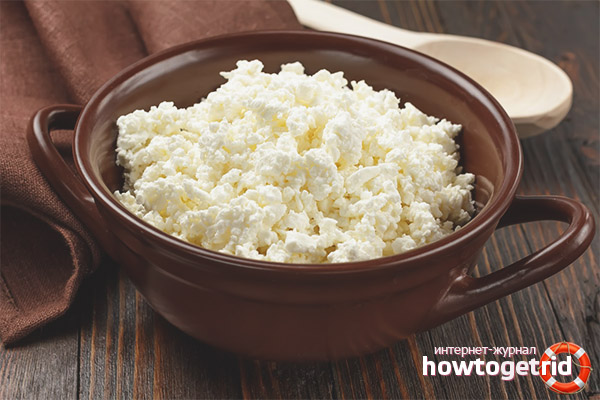
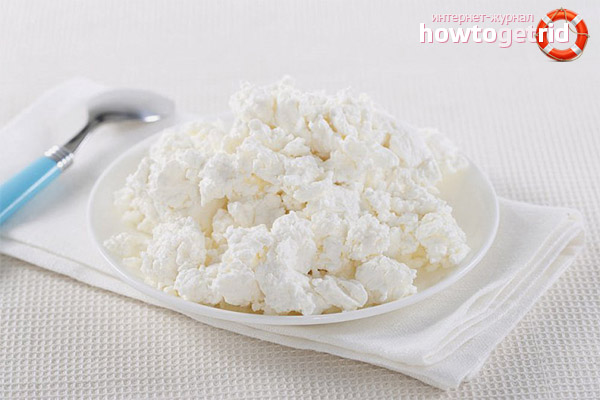


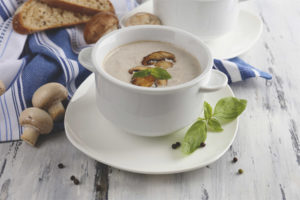
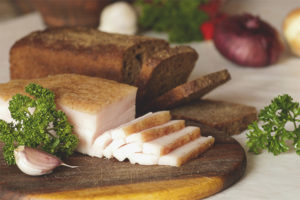
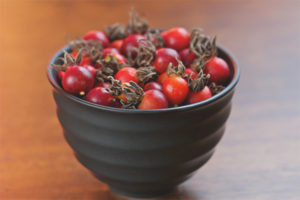


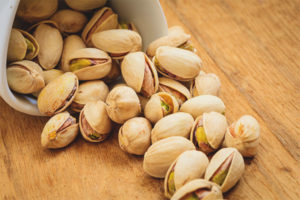
Submit